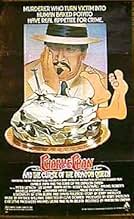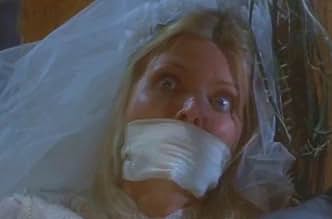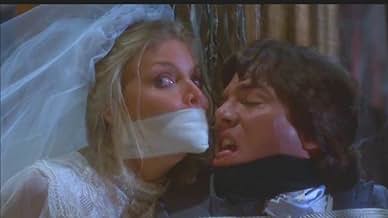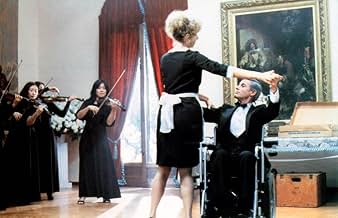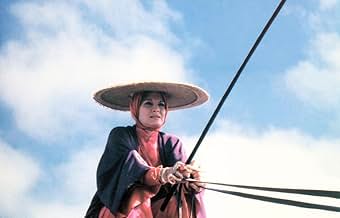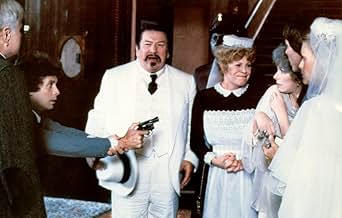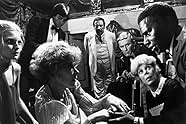Charlie Chan und der Fluch der Drachenkönigin
Originaltitel: Charlie Chan and the Curse of the Dragon Queen
IMDb-BEWERTUNG
4,1/10
1564
IHRE BEWERTUNG
Füge eine Handlung in deiner Sprache hinzuDetective Charlie Chan helps SFPD solve the many bizarre murders. His clumsy grandson Lee, who's getting married, "helps" him. Is the Dragon Queen behind this?Detective Charlie Chan helps SFPD solve the many bizarre murders. His clumsy grandson Lee, who's getting married, "helps" him. Is the Dragon Queen behind this?Detective Charlie Chan helps SFPD solve the many bizarre murders. His clumsy grandson Lee, who's getting married, "helps" him. Is the Dragon Queen behind this?
- Auszeichnungen
- 1 Nominierung insgesamt
Empfohlene Bewertungen
Ok. One of my all time favorite movies. Silly, pointless, aged stereotypes but just silliness from start to finish. Don't go in expecting a cinema masterpiece, just enjoy!
This is the perfect example of how not to make a Charlie Chan film--or any film for that matter! It was meant as a comedy--but it's not funny. The mystery is lame. The acting is awful. A good cast wasted by a terrible script! Peter Ustinov is better than this and should have said "No!" to this one. A big waste of time and money. Only for absolute Chan fanatics and then only so they can say , "Yeah. I saw it." To paraphrase from a much better Chan film, "Bad film like dead fish--can not stand test of time!" See any of the 20th Century Fox Chan films from the 30's and early 40's instead.
I guess because of the fact that back in the day Charlie Chan, Earl Derr Biggers
famous Chinese detective from the Honolulu PD was played by Occidentals like
Warner Oland, Sidney Toler, and Roland Winters it was OK to have Peter Ustinov do a
spoof. Maybe it could have worked in other hands with a better script and better
direction, but we've kind of grown past that kind of mimicry.
Charlie's come over to San Francisco from retirement in Honolulu for his grandson's wedding. Turns out that Lee Chan the number one son married a nice Jewish girl. His grandson however was raised by his Jewish grandmother Lee Grant who super doted on him. Now Richard Hatch as the grandson wants to follow in his grandfather's footsteps and become a detective. He's also marrying a nice Jewish girl in Michelle Pfeiffer.
Hatch maybe Charlie Chan's grandson, but he acts more like Inspector Clouseau in training. And there've been some random murders or seemingly random murders and looking good for it is Charlie Chan's arch nemesis the Dragon Queen played here by Angie Dickinson.
Hatch investigates, but of course it's Ustinov who solves it. Some others in the cast are Roddy McDowall as the butler and Rachel Roberts as the maid to Lee Grant. Best in this cast is Brian Keith a rather thick police chief who can't quite grasp the subtleties of Ustinov's mind and aphorisms.
This might have worked better if Ustinov spoofed his own character Hercule Poirot. But having us westerners play easterners just does not go over that well any more.
Charlie's come over to San Francisco from retirement in Honolulu for his grandson's wedding. Turns out that Lee Chan the number one son married a nice Jewish girl. His grandson however was raised by his Jewish grandmother Lee Grant who super doted on him. Now Richard Hatch as the grandson wants to follow in his grandfather's footsteps and become a detective. He's also marrying a nice Jewish girl in Michelle Pfeiffer.
Hatch maybe Charlie Chan's grandson, but he acts more like Inspector Clouseau in training. And there've been some random murders or seemingly random murders and looking good for it is Charlie Chan's arch nemesis the Dragon Queen played here by Angie Dickinson.
Hatch investigates, but of course it's Ustinov who solves it. Some others in the cast are Roddy McDowall as the butler and Rachel Roberts as the maid to Lee Grant. Best in this cast is Brian Keith a rather thick police chief who can't quite grasp the subtleties of Ustinov's mind and aphorisms.
This might have worked better if Ustinov spoofed his own character Hercule Poirot. But having us westerners play easterners just does not go over that well any more.
This is not a great movie, yet my wife and I laughed ourselves into pain. The great Peter Ustinov spins his previous role in oriental parody from "One Of Our Dinosaurs Is Missing"; Richard Hatch creates the most incompetent bumbler in decades of motion picture bumblers with some hilarious slapstick results; Lee Grant is a gorgeous grandmother; Roddy McDowell is the supercilious butler in a motorized wheelchair; and Michelle Pfeiffer is a ditzy Goldie Hawn clone - as well as being luminously beautiful and excellent at playing a brainless idealist just perfectly designed for the klutzy Lee Chan Jr. It is designed for fans of Charlie Chan, and it is a parody, but a loving one. The topical references are side-splitting; it helps to be old enough to have been an adult in 1981. The references to other movies abound, some subtle some obvious. The visual humour is on the level of slaps with a halibut but fun nonetheless. I gather the movie was a critical and box office flop. Even I missed it back then but I find it a guilty pleasure to disagree with almost everyone else on earth (except my wife, and that is what counts for more!): I enjoyed this idiotic little movie. And the dog deserved an Oscar.
This thing is no fun whatever.
Too bad, because it had a lot going for it.
First, there is the Charlie Chan legacy. It was something that walked with the movie-going public during that decade when our current notions of visual narrative evolved. It wasn't particularly influential except for the early notion that our on-screen eye differed from those around him in matters of cognition encoded visually by race. The explicit irony was the Chineseness of the man was deliberately bogus.
Second there's the appearance of Peter Ustinov. For this bit, you have to know the absolute importance of the fictional Hercule Poirot in how film discovery evolved. Ustinov had just played Poirot in the to-then most high budget detective story filmed. So when we see him (or did when this was new) as a similarly portly, pretentious, internally cogitating detective, it matters.
Third, someone involved was intelligent enough to set the thing properly. It begins with a faded black and white "old-style" Chan movie with our modern characters but a couple decades previously. The mystery shown bears on the one in our movie. Later, at the end of our movie, the action takes us to an old moviehouse in Chinatown where a Charlie Chan movie festival is being held. (No mention in our film that Chan has a film persona.) The trademarked end (copied from Poirot) where Chan gathers all the suspects and tells each one why they are the murderer, until revealing the real murderer (after a separately scripted false alarm) this happens in the scenery loft of the theater where a Chan film is playing below.
Naturally the chase to catch the murderer takes each character in front of the giant screen where the audience applauds them.
But its the truest of parodies. Usually parodies put new life into old form by adding a new layer of reference. Its a mistake to think that the "new life" would be funny, or more entertaining in any way. This is true parody: it took something that was dead and added enzymes to the decomposition.
There's one joke I appreciated. The Chan films are generally pretty vile in how they handle race. One trick is to set the bottom racially so that Chan can drift at the top in some cerebral racial advantage. That meant that the black driver was nearly subhuman. Stupid, ignoble.
The driver here is a black man also. Poised, attractive, articulate. We learn some noble things about him at the end.
Oh, another small matter of interest. It has a very young Michelle Pfeiffer, very pretty before she had all that work done on her face.
Ted's Evaluation -- 1 of 3: You can find something better to do with this part of your life.
Too bad, because it had a lot going for it.
First, there is the Charlie Chan legacy. It was something that walked with the movie-going public during that decade when our current notions of visual narrative evolved. It wasn't particularly influential except for the early notion that our on-screen eye differed from those around him in matters of cognition encoded visually by race. The explicit irony was the Chineseness of the man was deliberately bogus.
Second there's the appearance of Peter Ustinov. For this bit, you have to know the absolute importance of the fictional Hercule Poirot in how film discovery evolved. Ustinov had just played Poirot in the to-then most high budget detective story filmed. So when we see him (or did when this was new) as a similarly portly, pretentious, internally cogitating detective, it matters.
Third, someone involved was intelligent enough to set the thing properly. It begins with a faded black and white "old-style" Chan movie with our modern characters but a couple decades previously. The mystery shown bears on the one in our movie. Later, at the end of our movie, the action takes us to an old moviehouse in Chinatown where a Charlie Chan movie festival is being held. (No mention in our film that Chan has a film persona.) The trademarked end (copied from Poirot) where Chan gathers all the suspects and tells each one why they are the murderer, until revealing the real murderer (after a separately scripted false alarm) this happens in the scenery loft of the theater where a Chan film is playing below.
Naturally the chase to catch the murderer takes each character in front of the giant screen where the audience applauds them.
But its the truest of parodies. Usually parodies put new life into old form by adding a new layer of reference. Its a mistake to think that the "new life" would be funny, or more entertaining in any way. This is true parody: it took something that was dead and added enzymes to the decomposition.
There's one joke I appreciated. The Chan films are generally pretty vile in how they handle race. One trick is to set the bottom racially so that Chan can drift at the top in some cerebral racial advantage. That meant that the black driver was nearly subhuman. Stupid, ignoble.
The driver here is a black man also. Poised, attractive, articulate. We learn some noble things about him at the end.
Oh, another small matter of interest. It has a very young Michelle Pfeiffer, very pretty before she had all that work done on her face.
Ted's Evaluation -- 1 of 3: You can find something better to do with this part of your life.
Wusstest du schon
- WissenswertesIn the Shanghai bar scene, Lee Chan, Jr. (Richard Hatch) orders a "Captain Apollo on the rocks." Captain Apollo was Hatch's character on Kampfstern Galactica (1978).
- Patzer(1:23:58) The text of the newspaper clipping ("Pineapple King In Love Tryst") doesn't reference the case in the slightest.
- Zitate
Charlie Chan: Process of aging never agreeable, but better than alternative.
- VerbindungenEdited into How American Cinema Changed Hollywood Forever (2003)
- SoundtracksHappy Birthday to You
Written by Patty S. Hill and Mildred J. Hill
Performed by Michelle Pfeiffer and Richard Hatch
Top-Auswahl
Melde dich zum Bewerten an und greife auf die Watchlist für personalisierte Empfehlungen zu.
- How long is Charlie Chan and the Curse of the Dragon Queen?Powered by Alexa
Details
- Erscheinungsdatum
- Herkunftsland
- Sprache
- Auch bekannt als
- Charlie Chan and the Curse of the Dragon Queen
- Drehorte
- Produktionsfirmen
- Weitere beteiligte Unternehmen bei IMDbPro anzeigen
Zu dieser Seite beitragen
Bearbeitung vorschlagen oder fehlenden Inhalt hinzufügen

